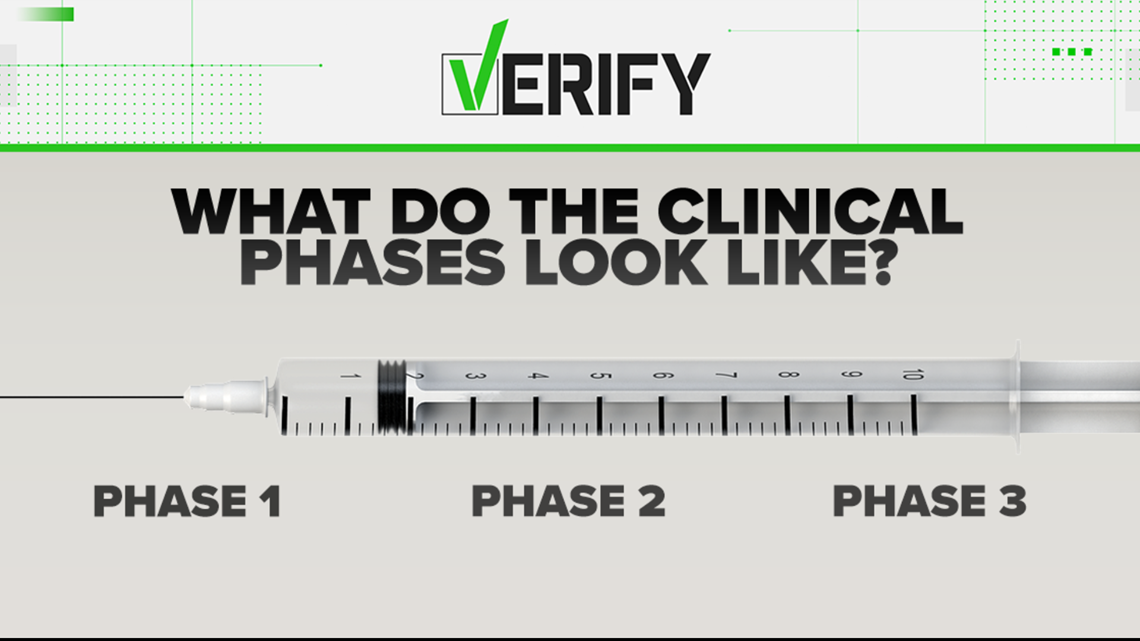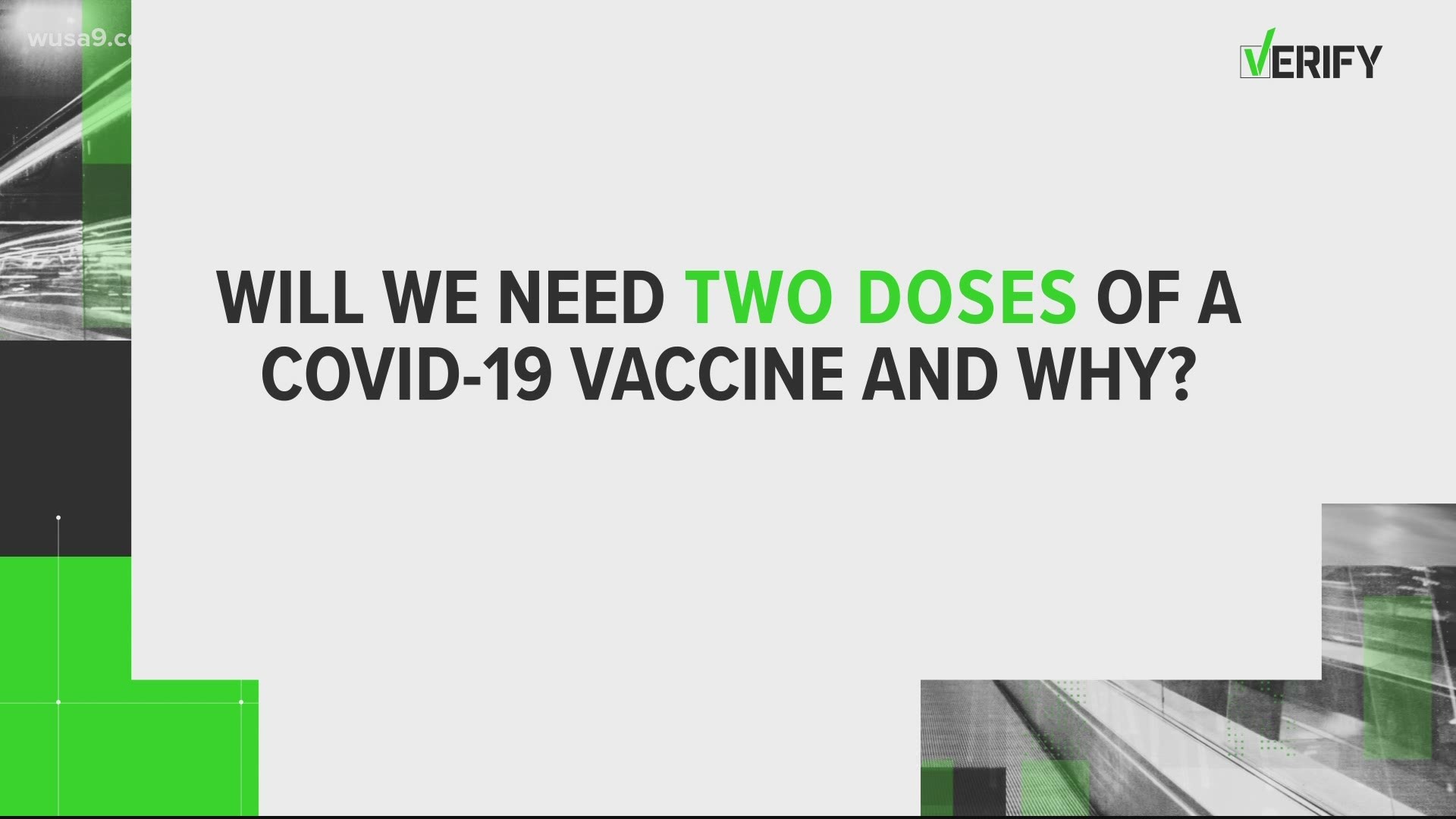WASHINGTON — Hope for an end to the COVID-19 pandemic appears to be on the horizon.
This month, Moderna and Pfizer, two companies producing COVID vaccine candidates, released preliminary finds from their phase 3 vaccine trials. And, remarkably, both show efficacy around 95 percent.
Several infectious disease specialists tell Verify the FDA could approve an Emergency Use Authorization for several vaccines in the next few weeks. But first, the FDA will analyze the companies’ data from their trials to ensure the vaccine is effective and safe.
THE QUESTION:
Does fast-tracking COVID vaccines mean there are fewer safety measures?
OUR SOURCES:
- Dr. David Diemert, a principal site investigator for Moderna’s phase 3 COVID vaccine trial.
- Dr. Arnold Monto, professor of epidemiology and Acting Chair of VRBPAC, an FDA advisory committee.
- Dr. William Schaffner, professor of infectious disease and part of CDC's Advisory Committee on Immunization Practices.
THE ANSWER:
COVID vaccine trials are not cutting safety measures. But Emergency Authorization comes with some inherent risk.
Inside a modest trailer at George Washington University, Dr. David Diemert and his team are part of groundbreaking vaccine development. The GW School of Medicine is 1 of nearly 100 test sites for Moderna’s phase 3 COVID vaccine clinical trial.
Dr. Diemert has helped develop vaccines for more than 20 years, but never at the pace of Operation Warp Speed.
“It’s been exhausting but rewarding at the same time,” Dr. Diemert said.
He says Moderna isn’t cutting any safety measures that are standard in vaccine trials.
“In fact we’re probably doing more in terms of safety assessments for this trial, because of the speed we want to be able to get an answer,” he said.
Moderna’s trial has more than 30 thousand volunteers – 350 are at GW. Half are getting the vaccine and the other half receive a placebo.
Patients fill out an electronic diary from home, which flags any COVID symptoms or vaccine side effects, which would require attention from the trial’s doctors.
GW clinic staff also call patients on a weekly basis to check on their condition. Dr. Diemert says it’s all standard practice.
“We’re meticulously documenting everything that happens to the participants in this study so we can really make an assessment of even rare things that might happen, that those are adequately being monitored,” Dr. Diemert said.
Who else is helping keep track of vaccine data?
That data is also being tracked by the Data and Safety Monitoring Board, an independent group of 10-15 experts that oversee all vaccine trials and have the power to pause or stop them over safety concerns.
Dr. William Schaffner has served on DSMBs several times. He’s an infectious disease specialist and a liaison representative to the CDC’s Advisory Committee on Immunization Practices.
“That is a safety feature that is rigorous,” Dr. Schaffner said of the Data and Safety Monitoring Boards. “They work independent of the company. They look at the data the company may not look at. So that’s a powerful safety feature.”
He echoed Dr. Diemert, saying that the oversight and safety measures for the major COVID vaccine trials have been standard.
“People can trust that safety measures were not cut,” Dr. Schaffner said.
But the vaccine approval process looks different.
How are vaccines approved?
In the coming weeks, companies will be requesting Emergency Use Authorization from the FDA and their Vaccines and Related Biological Products Advisory Committee, known as VRBPAC.
Dr. Arnold Monto is VRBPAC’s acting chair. The committee is made up of independent experts covering a range of specialties related to vaccines.
“We vote on whether or not we think the vaccine is effective and safe,” Dr. Monto told Verify. “The FDA usually takes that advice.
Dr. Monto says this approval process will be unique, because vaccines usually do not come up for Emergency Use Authorization.
Since they’re asking for an EUA, companies only need to show two months of data for half of their trial patients, a much shorter time period than trials seeking licensure.
So Dr. Monto has two concerns.


First, he says, immunity from a vaccine may not last. Second, a rare side effect, like enhanced respiratory disease or an autoimmune disease, may not be seen in patients for months.
“We need to watch for that, and be ready to detect it,” Dr. Monto said. “And it’s hard to predict before you see the data.”
Dr. Monto stressed that he has seen no red flags thus far.
Moderna’s trial will continue monitoring patients for two years. A vaccine could get pulled if safety concerns come up. The FDA will require companies to show six months of patient data to apply for COVID vaccine licensure.
BOTTOM LINE:
No, COVID vaccine trials are not cutting safety measures. But Emergency Authorization comes with inherent risk. Experts tell Verify, it’s most likely worth the risk.
“We would like to spare as many lives as possible,” Dr. Schaffner said. “Do you wait for all that information, which may take months and months more, while all these people are dying.”
Dr. Schaffner says he will take the vaccine once he qualifies for it. And so will Dr. Diemert.
“100 percent I would,” Dr. Diemert said. “From what I can see, it looks like it’s safe. And if it gets approved it means it’s effective as well. I don’t want to wear this mask for the rest of my life. I definitely would get vaccinated.”


